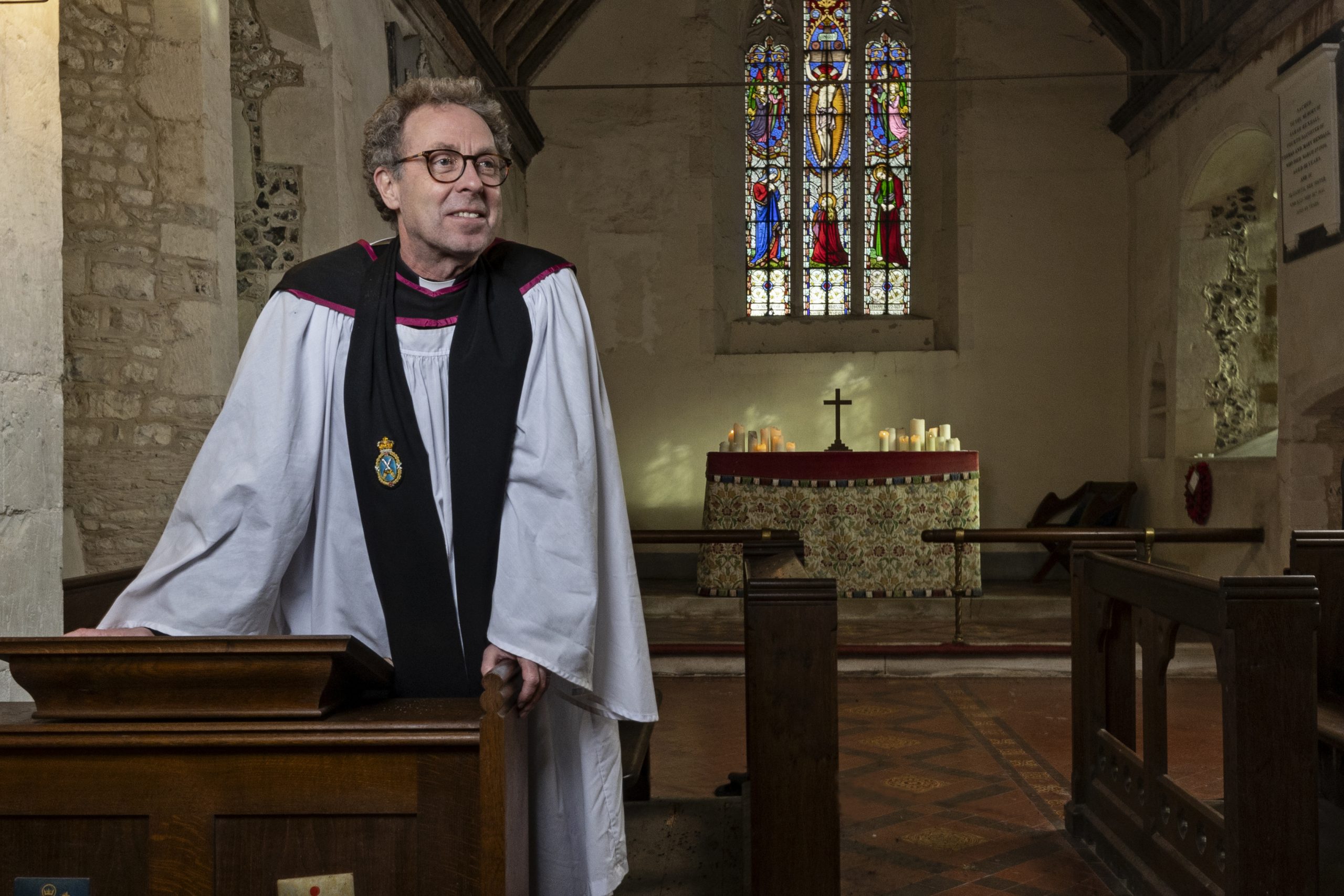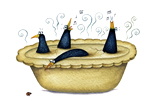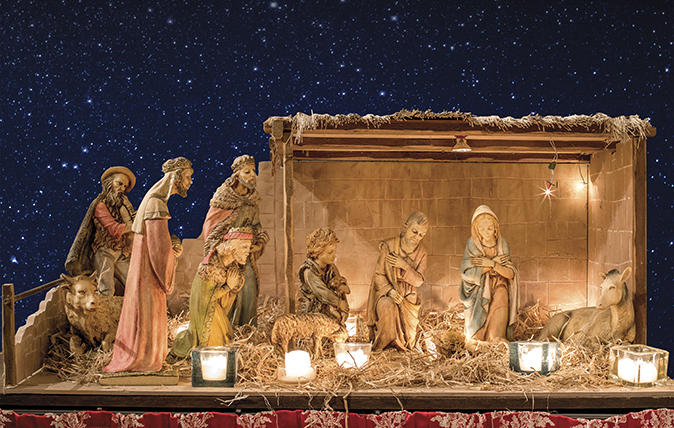‘The love we share at Christmas is a refuge. It replenishes our depleted batteries and allows us to go out again into the world’: The 2023 Country Life Christmas message, by Revd Colin Heber-Percy
A safe haven, a refuge for rest and relaxation, the place we feel we belong—the concept of ‘home’ differs for each of us. At Christmas, home is so much more than a physical location: it is all around, says the Revd Colin Heber-Percy.

Exquisite houses, the beauty of Nature, and how to get the most from your life, straight to your inbox.
You are now subscribed
Your newsletter sign-up was successful
Rest assured, no emperor has given an order or issued a decree. But nonetheless, at Christmas, many of us follow one particular Bible verse as if it were a binding injunction: ‘All went to their home towns’ (Luke 2.3). Our motorways will be choked with traffic, airport arrivals lounges thronging with expectant loved ones; we’ll wait stamping our feet and hugging our hands on cold railway-station platforms. As for Mary and Joseph, so for us: Christmas is a time of travel and of homecoming.
In the Gospel story, Mary and Joseph return to Bethlehem, Joseph’s home town, to be registered. We travel to be reunited. We travel home.
‘Where are you planning to spend Christmas?’ Apparently innocuous, this is, in fact, the toughest question I ask couples preparing for marriage. Almost invariably, they answer: ‘Home.’ Yes, I say, of course, but whose? Yours — or your new spouse’s? And there follows a realisation that, from now on, ‘home’ has to be hybrid. Where Christmas is spent will require negotiation, compromise.
The negotiations are protracted and difficult because home is precious to us. It’s a place where familiar patterns and precedents have, over the years, been endowed with deepest significance. At Christmas, this place becomes the backdrop for many well-rehearsed rituals: favourite recipes, favourite films, favourite carols, all magnified with meaning.
Although Joseph is returning to his home town, the story we remember at Christmas, the story retold in countless carol services and Nativity plays, has — at first glance — nothing to do with ‘home’. This is a story set in a country occupied by a hostile foreign power; it’s about a pregnant young woman forced to make a journey and to give birth to her baby far from her family, among animals in a filthy stable; its cast includes shepherds intruding with a strange message and unannounced visitors from a distant country. It ends with a massacre. Hardly homey.
For Mary and Joseph, the world around them is frightful, corrupt and confusing. There is no room for them, no home to go to. And yet, I think that this is a story about home in its profoundest sense. Because what the story offers us is a vivid and dramatic illustration of how we define ‘home’ by what it stands against.
Hived off, home is where the world isn’t. And Christmas is when the world isn’t. The place and the time become redoubts, ramparts against the world and its imperatives. The Nativity story reminds us of the value of home by accenting the world’s cruelty and carelessness. As in children’s games, ‘home’ is safety, truce, a space outside the contest. At Christmas, home is made sacred. After your journey, when you finally reach home and stillness, you take off your shoes at the front door, ‘for the place on which you are standing is holy ground’ (Exodus 3.5).
Exquisite houses, the beauty of Nature, and how to get the most from your life, straight to your inbox.
You can shield property from the world with locks or fences or expensive surveillance equipment, but home isn’t property and you can only shield it with love. The love we share at Christmas, with our families and friends, is a refuge. It replenishes our depleted batteries and allows us to go out again into the world to confront all the demands and vicissitudes of everyday life.
Let me explain what I mean by way of a confession. When I was at school, at the end of every Christmas term, my friend Mike and I would surreptitiously unhook a bauble from the Christmas tree in the boarding house where we lived. We’d pocket the bauble. After tea, under cover of darkness, we’d flee the boarding house, shin over the school wall, cross the road and make our way into a scruffy copse. Here, puffing on Consulates, we’d bury the bauble in frosty ground and reflect on how, come January, at the start of a new term, we’d unearth the shiny thing and remember the time we’d buried it, when we were still looking forward to home, to family and the holidays.
"The Wise Men make a hazardous journey to reach their destination: a child with his mother. To mark their arrival, they offer him baubles: shiny metal, smelly stuff"
What Mike and I were about, it seems to me, on those occasions, goes to the heart of our ideas of home — and Christmas. Home is a space apart and Christmas is a time apart. The coming together of this space and this time is a holy conjunction, an alignment. Taking the bauble from the tree and burying it beyond the school gates was a way — an eccentric way, I grant you — of recognising, in ritual, our longing for home and its essential separation from the ghastliness and moral squalor of our minor public school.
To reach that recognition, Mike and I had to travel, to cross borders, to put ourselves at risk of being caught and punished. This was important. Perhaps, for any ritual to remain vital and meaningful, it must be transgressive, it must put you on your mettle. In the Bible story, the Wise Men make a hazardous journey across borders, following a star to reach their destination: a child with his mother. To mark their arrival, they offer him baubles: shiny metal, smelly stuff.
At a school Nativity play last week, when it came to the part of the story where the Wise Men present their gifts to the Christ child, one little girl piped up with a question: ‘What’s frankincense?’ As it happened, I had a few nuggets with me and so — by way of demonstration — we burned some frankincense in a little saucer. The room filled with smoke and squeals of excitement. It was a bit like those Royal Institute Christmas lectures my brother and I used to watch between Boxing Day and New Year. A scientist with a beard and a tank top doing experiments.
We managed to avoid setting off smoke alarms, no one had an asthma attack and the children learned what frankincense is. But the little girl had a follow-up question: ‘Why did they give Jesus that?’ Of course, there’s a stock answer. The gold represents Christ’s Kingship, the frankincense his Divinity, the myrrh his Death — but that all seemed a bit much for a primary-school Nativity play. Instead, I offered her this: the gifts are a way of recognising Jesus as their destination, their end, their home. These are housewarming presents.
The Wise Men are trying to do with their gifts what Mike and I were trying to do with the bauble: acknowledging something — or someone — as fundamentally significant, as home.
The ‘home’ that is revealed in the Nativity story will refuse to be conformed to this world of vested interests and a wildly unjust status quo, will stand up against the might of emperors and the wiles of hypocrites. This child is a home that is open for all, a home that might be reached after a long and arduous journey or might lie just beyond the school gates, but which is also right in front of us right now. A home that is always and everywhere awaiting us. ‘For everyone who knocks, the door will be opened’ (Matthew 7.7).
Wherever you are this Christmas, I pray that you may find your way home.
The Revd Dr Colin Heber-Percy is vicar of the Savernake Forest parishes in Wiltshire and the author of ‘Tales of a Country Parish’ (Short Books)

What the twelve days of Christmas really mean
Kit Hesketh-Harvey takes a close look at the weird words in The Twelve Days of Christmas

‘It’s all about wonder and to look, to be able to ponder’ – the story behind spectacular nativity scenes
Each December, a newborn baby takes centre stage in Nativity scenes throughout the land. Julie Harding meets those responsible for